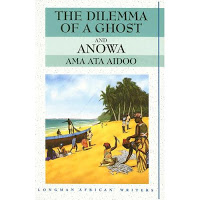
I was fortunate to be taught by Ola Rotimi at university in the US. He appeared at that time entirely circular, due to the huge number of layers he wore against the Minnesota cold. He was a charming and intelligent man, with a fiery passon for African theatre, and a great many opinions on all subjects from the World Bank (very negative) to palm wine (very positive). He once bought me a theatre ticket, and signed the card to ‘his little African sister.’ A lovely man. He passed away in 2000.
OUR HUSBAND HAS GONE MAD AGAIN is my favourite of all his works. It carries a genuinely crazy West African energy, and you can’t help but adore it’s fine disregard for Western realism. The play tells the story of one Major Lejoka-Brown, who despite having left the army many years ago, and made a fortune in cocoa, still carries himself as a miltary man, and now that he is entering politics is organising his campaign on bizarrely miliatry lines.
Before the play begins, he has married a Kenyan woman, Liza, who has since been studying medicine in the US. She is now on her way to live with him in Nigeria, and is unaware that he has not one, but two other wives, and the Major is determined to keep it that way. Really he loves Liza, and the two wives are sort of unintentional: one is much older, his late brother’s wife, who he had to marry as per Muslim custom, and the other much younger, who he married to advance his political career. Liza arrives and predictably discovers the two other wives; but from there on it all becomes more and more unpredictable. Liza forges allegiances with the wives, teaching the older about supply and demand, so she becomes a chicken magnate, and inciting the younger to oppose the Major in his ludicrous election.
There’s a wild mix of ideas here, about gender equity, old and new Nigerias, bikinis and hijabs, etc etc. It’s a lovely little show. The plot is maybe a teensy bit weak, but somehow I really don’t care.

